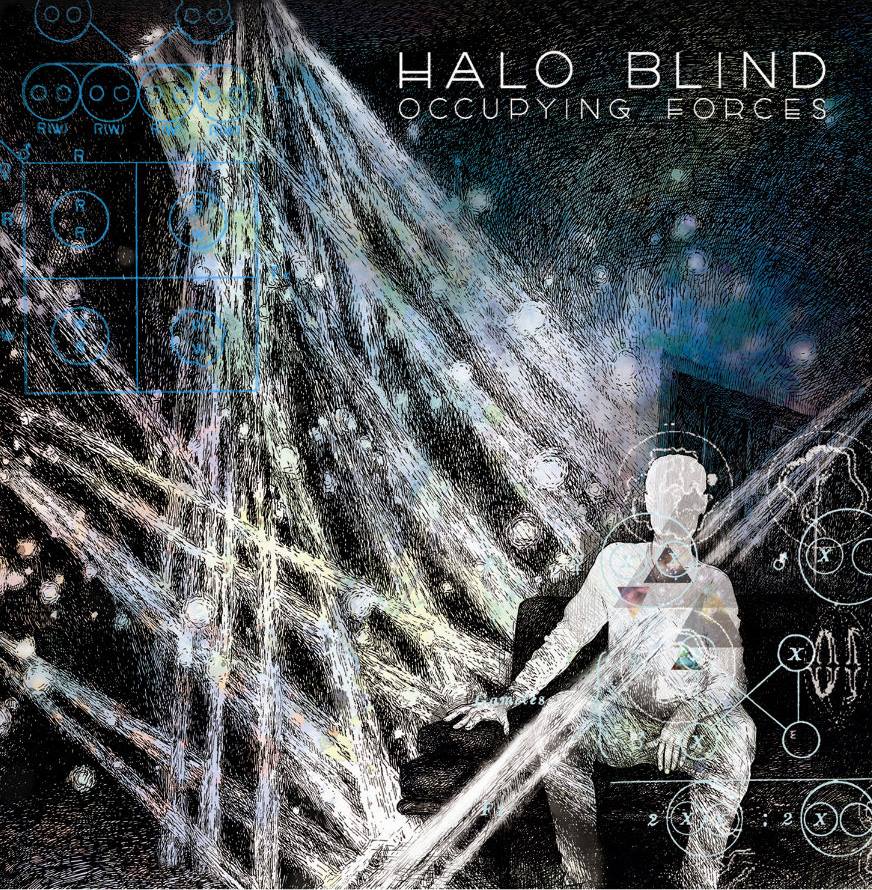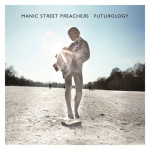The sound created by York-based Halo Blind is what happens when five skilled musicians with backgrounds in various groups, backing bands and session recordings bind together to form a solid unit. Imagine my surprise when I found out that this new up and coming band features bassist Stuart Fletcher, who used to be in The Seahorses. Small world. The band’s blend of rock, indie and prog more often than not provides a pleasing listening experience.
With the intriguing ‘Better’, the band’s second LP opens with dramatic, urgent piano notes before interesting rhythms and plaintively atmospheric vocals enter the picture along with the dark chime of guitars, the mood grows heavier throughout until they let it rip in the climactic final minutes. It’s probably fair to say they’ve learned a few tricks from Radiohead, but they are of course, not the first band to be influenced by other musicians. This influence is accentuated by the vocals of Andy Knights and without the strength of the songwriting and arrangements, people would have dismissed them as soundalikes. Why deny yourself the pleasure of this fine music just because the singer’s voice happens to sound like someone else? The songs elevate the band’s music into a place of its own, and the mixture of flavours ensures that Halo Blind’s existence is necessary. As well as bringing plenty of their own style, they do things that Radiohead aren’t able to do anymore, and they’re not afraid to bring out the guitars. But if ‘OK Computer’ was the sound of pre millennial tension, then this is very much the sound of 21st century unrest.
 You’d be mistaken for thinking that this is all Thom Yorke-esque paranoia though, in fact what we have here is an admirably diverse album. And when Knights and Chris Johnson swap over the vocal duties, these switches immediately bring out different sides to the band’s music. Taking a stand against complacency is the explosive ‘Revolutionary Soul’, which ticks with burning angst and seethes with the sort of raw, socio political anger that is bound to inspire plenty of fists to hit the air when played live. Imagine if Britpop suddenly went punk. The following ‘Mirage’ is the third of three opening highlights, displaying a knack for beautifully emotive vocal melodies and a chiming sadness that again recalls the gentler moments of ‘OK Computer’. Stunning. It casts a long shadow over the bleak ‘Saturate’, which could have done with some work on the lyrical/musical combination during the verses, but does have a lovely outro. The double bill of ‘Torrential’ and ‘Downpour’ is a mixed blessing: although the former is indeed a darkly anthemic indie rock epic, the latter isn’t quite as effective. It’s a bravely eclectic record, playing around with brass bands on the brief divider ‘End Of The First Side’, an idea that in an odd way almost echoes Blur‘s albums of the mid 90s.
You’d be mistaken for thinking that this is all Thom Yorke-esque paranoia though, in fact what we have here is an admirably diverse album. And when Knights and Chris Johnson swap over the vocal duties, these switches immediately bring out different sides to the band’s music. Taking a stand against complacency is the explosive ‘Revolutionary Soul’, which ticks with burning angst and seethes with the sort of raw, socio political anger that is bound to inspire plenty of fists to hit the air when played live. Imagine if Britpop suddenly went punk. The following ‘Mirage’ is the third of three opening highlights, displaying a knack for beautifully emotive vocal melodies and a chiming sadness that again recalls the gentler moments of ‘OK Computer’. Stunning. It casts a long shadow over the bleak ‘Saturate’, which could have done with some work on the lyrical/musical combination during the verses, but does have a lovely outro. The double bill of ‘Torrential’ and ‘Downpour’ is a mixed blessing: although the former is indeed a darkly anthemic indie rock epic, the latter isn’t quite as effective. It’s a bravely eclectic record, playing around with brass bands on the brief divider ‘End Of The First Side’, an idea that in an odd way almost echoes Blur‘s albums of the mid 90s.
Meanwhile, the prominently mad ‘Brain Dogs’ mixes hard rock riffs with raw funk beats and hungry, unhinged vocals. It even recalls ridiculously underrated 90s legends Mansun at times. Ultimately, the chorus lacks the punch it really requires, but at times it feels like that doesn’t matter when the rest of it is so brilliantly mad. You’ll either love it or hate it, or like me, change your opinion on it several times. The undeniable influence of Radiohead is again conspicuous during highlight ‘False Alarm’, where hypnotic introspection is paired with a cold sense of paranoia before something indescribable emerges and takes it elsewhere, once again ensuring that the music is not overly derivative. Echoes of the aforementioned Oxford group can also be heard within the fidgety electronic percussion and processed voices of the fantastic ‘Analogue’, although there is a greater emphasis on melody and structure.
The haunting, sparse instrumentation of ‘The Puppet’ focuses in on masterfully placed piano chords and and a solemnly soaring vocal, as a nicely composed tune is underpinned by a graceful sense of hope. Elsewhere, the mournful ‘Smithereens‘ doesn’t quite hit the mark, despite a simple and superb cry of guitars near the end, as well as a surprising touch of ukelele that proves to be an unexpectedly well suited embellishment. The dark melodrama of ‘Coma’ is almost something Brett Anderson would be proud of, and offers one last burst of surging emotion before the album closes with the dreamy haze of ‘Control’.
Slightly overlong, perhaps some necessary editing would improved the end product, but that’s no reason not to enjoy the many high points of ‘Occupying Forces’. Ambitious, and fearlessly eclectic it is. Sometimes it works, sometimes it doesn’t, but you can’t fault them for having a go. Diverse and epic.
[Rating: 3.5]






